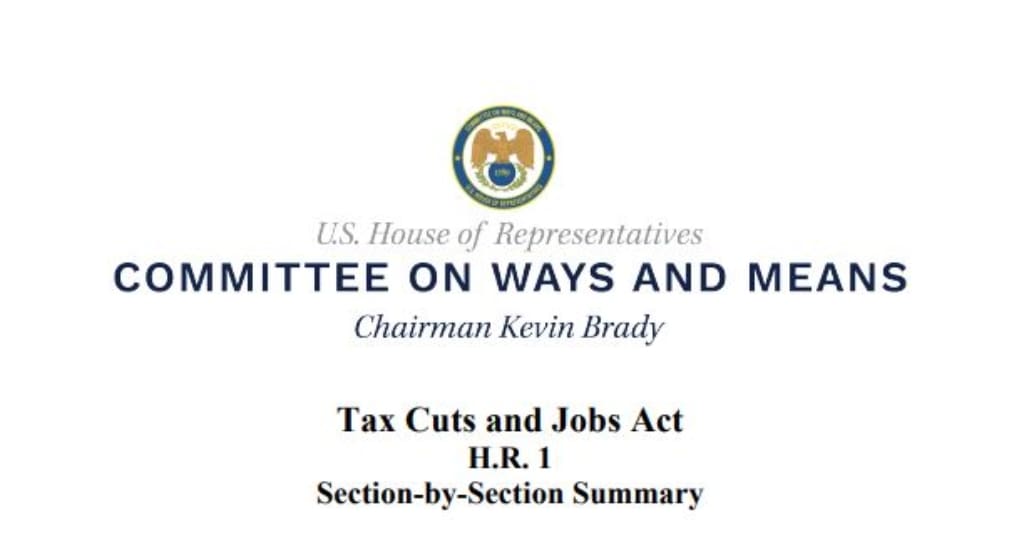
Federal Update
Tax Reform
Reports are that conferees have reached an agreement in principle on Tax Reform legislation. Yesterday, the Tax Cuts and Jobs Act conference committee held an open meeting. House Ways and Means Committee Chairman Kevin Brady (R-Texas) noted that the conference report, which will include details on the reconciled tax reform bill, will be filed by the end of this week to allow lawmakers and the public to review it.
What we are hearing is that the bill includes:
- 37 percent top individual income tax rate; individual Alternative Minimum Tax retained but only for individuals with income above $500,000 (above $1 million for married couples);
- 21 percent top corporate income tax rate effective 1-1-18; corporate Alternative Minimum Tax repealed;
- 20 percent deduction for qualifying pass-through income;
- Estate tax retained, but exemption roughly doubled;
- Deduction of up to $10,000 for combination of state and local property, income, and sales taxes;
- Mortgage interest deduction cap lowered to $750,000 from current $1 million;
- Private Activity Bonds (PABs) retained;
- LIHTC retained; no definitive word on the inclusion of Senator Roberts’ veterans and rural housing amendments or the offsets;
- LIHTC partially or entirely excluded from Base Erosion Anti-abuse Tax (BEAT) calculation in line with treatment already afforded to the R&D credit (this issue was still fluid as of December 13th);
- NMTC retained; HTC retained but claimed ratably over a 5-year period.
We have not seen any language yet, so we cannot say for sure what the final package means for affordable housing. Reports indicate that Private Activity Bonds may have been preserved, however we do not know in what form. House leadership was looking to limit their scope, and there was a question as to whether that would leave affordable housing out in the cold. As a reminder, if PABs are eliminated as proposed, over $700 million of multifamily development currently underway in North Carolina would come to a halt. The North Carolina Housing Finance Agency has approved or received applications for 61 properties totaling 6,286 units requesting $460,125,000 in tax exempt bond volume, which would finance over $700 million worth of multifamily housing development.
Homelessness Assessment Report
HUD released its 2017 Annual Homeless Assessment Report (AHAR) to Congress this month. From the North Carolina Coalition to End Homelessness: “overall, the report shows continued progress in many parts of the country, including North Carolina, but also indicates some stalled progress and increases in areas of the country. 30 states and the District of Columbia reported decreases in the total number homeless. North Carolina’s estimated total number of homelessness decreased by 6% in one year to 8,962. This is part of an overall 26% decrease in homelessness since 2010.”
Other key findings:
- Across the country, an estimated 553,742 people experience homelessness on any given night. The estimated total number increased by 1% (or 3,814 people). The first increase in seven years.
- Veterans homelessness experienced a slight 1.5% increases, and chronic homelessness went up by 12% due to a combination of worsening conditions and better efforts to identify people experiencing chronic homelessness.
- The report does indicate that high costs and low vacancy rates in some areas of the country are putting more people at risk of entering homelessness and making it harder for people to exit homelessness.
State Update
DEP Rate Case
Duke Energy Progress requested that the Utilities Commission allow a 75% increase in its mandatory fee. This is would be the largest increase since 2013 when the fixed charge went from $6.75 to the current level of $11.13. Duke Energy and the Public Staff – the lead advocate for utility customers – have reached a partial settlement that would raise the mandatory fee to $14 a month, a 25.8% increase. Unfortunately, Duke sees this increase as a step to even higher fixed charges. At the hearing on the rate increase before the Utilities Commission, a witness for Duke acknowledged that the utility will seek to recover $27 a month in mandatory fees from its residential customers. The company sees further upward pressure on those fees in the near future. The North Carolina Housing Coalition is an intervener in this case. To read more, click here.
Final 2018 QAP
The final 2018 QAP was released this week. The following are changes from the second draft QAP:
- Tax credit maximum for a Principal is unchanged from 2017 at $1,800,000 (page 7)
- Maximum per unit cost for Chart A is $78,000; Chart B is $89,000; adaptive reuse is $99,000 (page 17)
- Credits per unit points and calculations are unchanged from 2017; additional language has been added to this section (pages 20 and 21)

Local Update
Orange County Affordable Housing Summit
The Orange County Affordable Housing Coalition will be hosting a summit to bring together elected officials, government staff, community organizations, and the public to have a conversation about affordable housing development in the county. The event will be Friday, January 5, 2018 from 10am to 1pm. You can register for this event here.
Reports
Enterprise: The Positive Impacts of Affordable Housing on Health: A Research Summary








